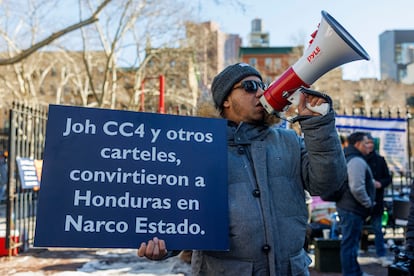New York prosecutor accuses former Honduran president Juan Orlando Hernández of ‘protecting’ drug traffickers
US authorities claim that the ex-leader worked ‘hand in hand’ with violent criminal organizations, such as the Sinaloa Cartel, to send cocaine into the United States


The trial in New York against the former president of Honduras, Juan Orlando Hernández, has begun with explosive allegations from the prosecution. U.S. authorities accused the former president on Wednesday of having used the police, the army and the judicial system to “protect” drug traffickers and amass a fortune.
“For years, he worked hand in hand with some of the largest and most violent drug traffickers in Honduras to send ton after ton of cocaine here, to the United States, traffickers who fueled his rise to power with millions of dollars in bribes,” prosecutor David Robles said. “Behind the scenes, he made sure that drug traffickers who remained loyal to him were protected.”
The assistant U.S. attorney said that he will present evidence that supports these accusations throughout the trial, while the defense team for Hernández dismissed the allegations.
The trial started on Tuesday with the selection of the jury, who will hear the arguments of both sides and then decide the future of the former Honduran president, who was detained in his home in Tegucigalpa in February 2022, hours after Washington requested his extradition. The United States has accused Hernández of sending thousands of kilos of cocaine into the U.S. from Colombia while he was president (2014-2022). Hernández was arrested two weeks after his term ended, and he handed over control of the Central American country to the current president, Xiomara Castro, who has not yet commented on the trial.
Castro’s husband, former president Manuel Zelaya, has, however, spoken out. The politician — who was removed from power by a coup d’état in 2009 and exiled to Costa Rica — defended himself against the accusations made by one of the witnesses presented by the prosecution, who has accused Zelaya of receiving checks from organized crime to finance his political campaign. The same witness also said that former president Porfirio Lobo accepted financing from criminal groups. “I have never received, either personally or in my account, money or checks, neither during my campaign 19 years ago in 2005, nor later in the presidency, during exile, or in the resistance,” Zelaya said in a message posted on X (formerly Twitter). Lobo has also denied the accusations.
No he recibido nunca, ni personalmente ni en mi cuenta, dinero ni cheques del señor Sánchez, ni durante mi campaña de hace 19 años en el 2005, ni posteriormente en la presidencia, durante el exilio, o en la resistencia, NUNCA. @innercitypress
— Manuel Zelaya R. (@manuelzr) February 21, 2024
The witness presented by the prosecution — known in Honduran media as the “accountant” as their identity is protected — was present in meetings that Hernández allegedly held with drug traffickers during his presidential campaign. According to the witness, the former president protected the drug trafficker Geovanny Fuentes “to shove the drugs right up the noses of the gringos,” said Robles.
The U.S. authorities have accused Hernández of creating a network in Honduras to enable drug trafficking groups such as the Sinaloa Cartel to introduce drugs into the country with the support of police, the military and the judicial system. “With the help of powerful organizations such as the Sinaloa Cartel, [Hernández] became a powerful man who abused that power to send drugs to the United States without fear or consequences,” said Robles.
The trial against Hernández has raised great expectations in Honduras, a country mired in violence unleashed by gangs and organized crime that has one of the highest poverty rates of the continent. During the first days of the trial, dozens of people protested against the former president near the New York court, demanding he be convicted. In March 2021, a Manhattan federal court sentenced his brother, Juan Antonio “Tony” Hernández, to life in prison plus 30 years.
Sign up for our weekly newsletter to get more English-language news coverage from EL PAÍS USA Edition
Tu suscripción se está usando en otro dispositivo
¿Quieres añadir otro usuario a tu suscripción?
Si continúas leyendo en este dispositivo, no se podrá leer en el otro.
FlechaTu suscripción se está usando en otro dispositivo y solo puedes acceder a EL PAÍS desde un dispositivo a la vez.
Si quieres compartir tu cuenta, cambia tu suscripción a la modalidad Premium, así podrás añadir otro usuario. Cada uno accederá con su propia cuenta de email, lo que os permitirá personalizar vuestra experiencia en EL PAÍS.
¿Tienes una suscripción de empresa? Accede aquí para contratar más cuentas.
En el caso de no saber quién está usando tu cuenta, te recomendamos cambiar tu contraseña aquí.
Si decides continuar compartiendo tu cuenta, este mensaje se mostrará en tu dispositivo y en el de la otra persona que está usando tu cuenta de forma indefinida, afectando a tu experiencia de lectura. Puedes consultar aquí los términos y condiciones de la suscripción digital.








































